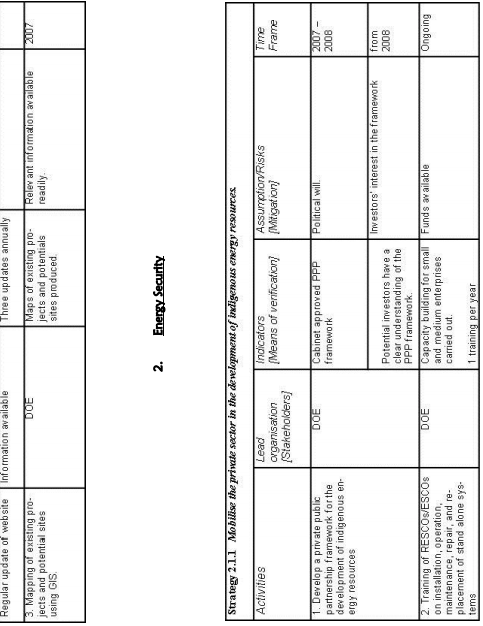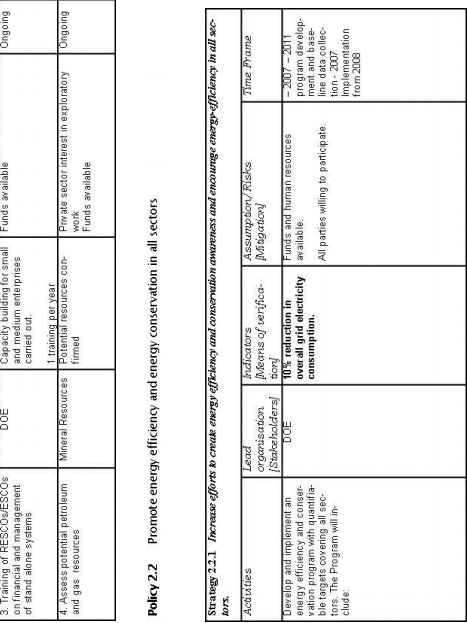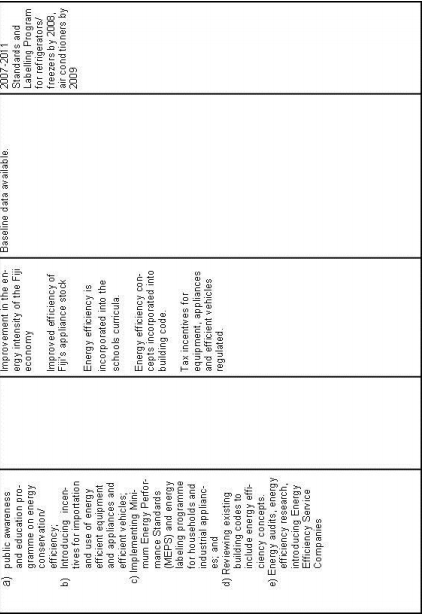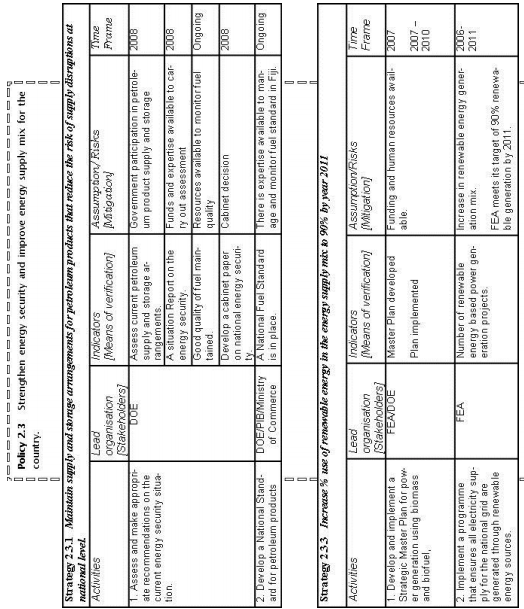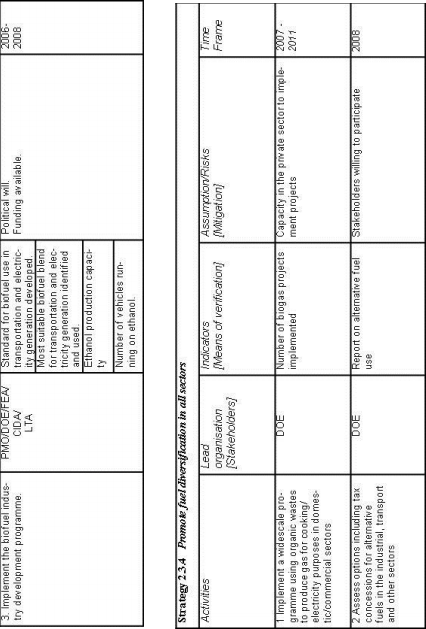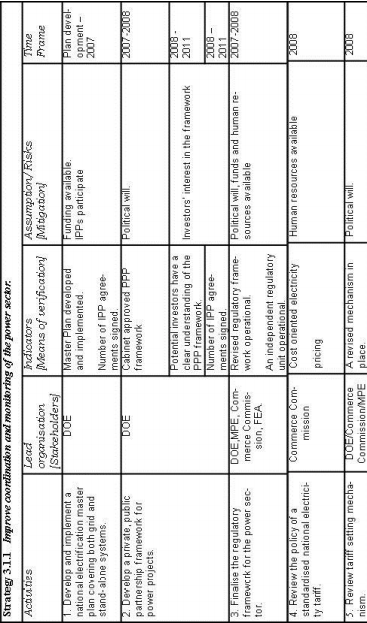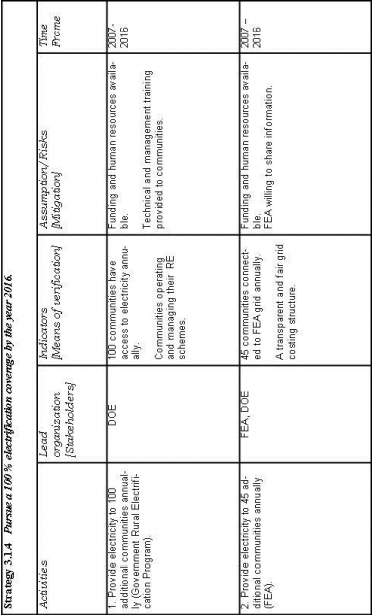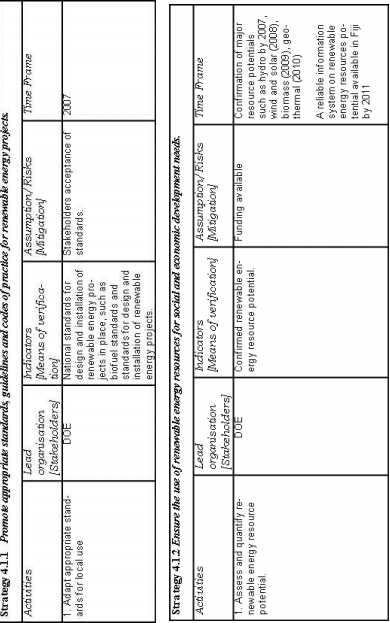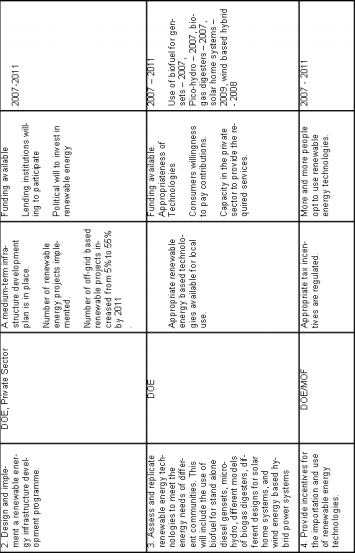NATIONAL ENERGY POLICY
Department Of Energy
Ministry Of Energy & Mineral Resources
Fiji Islands
November 2006
1.0 National Energy Policy Development Background 6
1.1 Introduction 6
1.2 Overview of Energy Sector 6
1.2.1 Current Legislation and Policies Related to Energy 6
1.2.2 Energy Supply 7
1.2.3 Energy Demand 8
1.2.4 Energy Sector Institutions 9
1.2.5 Power Sector Regulation 10
1.3 Issues for Policy Considerations 10
1.3.1 Roles and Responsibilities of Governance Institutions 10
1.3.1.1 The Department of Energy 10
1.3.1.2 FEA 10
1.3.1.3 Ministry of Public Enterprise and Public
Sector Reform 11
1.3.2 Energy Sector Regulation 11
1.3.3 Tariffs and Pricing 12
1.3.4 Capacity Building and Human Resource Development 12
1.3.5 Private Sector Participation 13
1.3.6 Industry, Commerce and Mining 13
1.3.7 Agriculture 14
1.3.8 Encouraging Competition 14
1.3.9 Energy and the Environment 14
1.4 Problem Analysis 15
1.4.1 Vulnerability 15
1.4.2 Energy Pricing and Subsidies 15
1.4.3 Risks 15
1.4.4 Insufficient Private Sector Participation 16
1.4.5 Constraints in the Energy Sector 16
2.0 Energy Sector Policies 17
2.1 Vision, Mission, Strategic Areas and Objectives 17
2.2 Policies 18
2.2.1 Energy Planning 18
2.2.2 Energy Security 18
2.2.3 Power Sector 19
2.2.4 Renewable Energy 21
2.3 Principles of the Policies 22
2.4 Implementation Strategy 23
3.0 Strategic Action Plan 23
4.0 Summary of the National Energy Policy
& Strategic Action Plan 39
Foreword
The National Energy Policy (NEP) provides a common framework for all (both public and private) associated with the energy sector to work towards for optimum utilization of energy resources for the overall growth and development of the economy over the next five years. The NEP is closely aligned to the National Strategic Development Plan (2007 – 2011).There are four key strategic areas that the NEP focuses on:
[i] National Energy Planning
Energy planning covers four broad areas of institutional strengthening of the Department of Energy, development and review of appropriate frameworks, coordination and consultation within the energy sector and with other sectors, and management of energy information. It is expected that a well resourced and strengthened Department of Energy will be in place. Relevant enabling frameworks will be developed, and a transparent and accountable regulatory agency for the power sector will be established. A reliable energy information system for decision making will be available. There will be efficient and effective service delivery with measurable and continual improvement in customer satisfaction.
[ii] Energy Security
Energy security ensures stable and adequate energy supplies to the country through diversifying our energy base and developing indigenous renewable energy resources and other alternative fuels; and encouraging energy conservation and efficiency in energy production, conversion and use. It is expected that there will be reduced reliance on imported fossil fuels with renewable energy providing 90% of grid electricity supply and 55% for off-grid (stand alone) supply by 2011; 30% of transport fuel will be from alternative sources such as LPG and biofuel by 2010 and a 10% reduction in the national grid electricity consumption by 2011 with improved efficiency of Fiji’s appliance stock. An assessment of our current energy security situation will be carried out.
[iii] Power Sector
This strategic area ensures that the entire population has access to electricity through the extension of FEA grid network, stand-alone systems by the Department of Energy, and extensions from government stations by the PWD. The involvement of the private sector in the provision of electricity will be continually encouraged. It is expected that by 2011, the country will have 90% national electrification coverage where the urban areas will have 100% access to electricity whereas the rural areas will have 85% access
[iv] Renewable Energy
The focus of this strategic area is to ensure increased use of affordable and appropriate renewable energy technologies through quantifying the local renewable energy resources available, providing incentives for the importation and use of renewable technologies, and adapting renewable energy based standards for local use. It is expected that there will be a marked increase in the use of renewable energy based technologies. These four key strategic areas were identified after much consideration of the existing energy sector constraints, the current energy sector programs and where we would like the energy sector to be in the next five years.
The NEP aims to:
strengthen the capacity for energy planning through appropriate policy, regulatory and
implementation frameworks and effective and efficient management;
enhance energy security through greater participation and collaboration within the industry;
increase access to affordable and reliable electricity services; and
research, promote and utilize renewable energy applications.
The NEP adheres to the following principles: social and gender equity, environmental compatibility, stakeholder participation, good governance, public acceptance, and energy efficiency and conservation. The Department of Energy will be the lead organization responsible for the implementation of the NEP and will ensure that the objectives of the policy are met. To further assist in the policy implementation process, an Energy Advisory Committee (EAC) will be set up. The duties of the EAC are solely advisory and will provide guidance on design, implementation and evaluation of energy sector policies and programs. The Committee whose members will be drawn from both within and outside government will ensure that the NEP captures the aspirations of the national Strategic Development Plan (2007 – 2011).
The NEP will be implemented in 2007 and will be reviewed in 2011. The strategic action plan includes activities that cover the five year period from 2007 to 2011 but will be reviewed on a yearly basis.
This document is the result of collaboration amongst the various stakeholders in government, the private sector and NGOs.
I wish to thank all those who have assisted in the production of the NEP and its Strategic Action Plan. My deepest gratitude to SOPAC’s Pacific Islands Energy Policy and Strategic Action Planning Division who has been our major partner in the production of this document. I am optimistic that this document will be useful in supporting our efforts to provide a coherent view of our energy challenges and opportunities that would enable a sustainable development of the energy sector.
Lekh Ram Vayeshnoi MINISTER FOR ENERGY & MINERAL RESOURCES
1.1 Introduction
The Strategic Development Plan (SDP) for 2003-2005 of the Fiji Government sets the energy sector goal as “to facilitate the development of a resource efficient, cost effective and environmentally sustainable energy sector.” One of the key indicators of the energy component of the SDP is the formulation of “a comprehensive national energy policy to address renewable energy, efficiency and affordability, and environmental sustainability”. The development of this National Energy Policy (NEP) document satisfies the requirements of the SDP 2003 – 2005.
The decision to update and combine various policies guiding Fiji’s energy sector into a single comprehensive and balanced energy policy stems from the need to take into account the political, economic and social changes that have taken place in the last five years in Fiji. Concerns for the environment and the more efficient use of energy have evolved further, together with security of supply and concepts of sustainable development that have come into increasing prominence. Global market issues, in particular the dramatic increase in oil prices experienced in 2005 create new opportunities as well as challenges for supporting energy projects that develop indigenous resources and diversify supply. The Kyoto Protocol, which is now legally binding on developed “Annex I” countries, offers new opportunities to support developing nations such as Fiji in the area of sustainable energy sector development.
1.2 Overview of Energy Sector
1.2.1 Current Legislation and Policies Related to Energy
There are a number of acts, regulations and policies that affect energy sector activities that the NEP aims to compliment. The following is a list of current laws (Acts) and policies that are in place dealing with Energy:
Native Land Trust Act (Cap. 134) and Crown Lands Act (132): The use (i.e. leasing) of native and crown land in Fiji for any purpose other than agricultural must be done in accordance with the provisions of the above pieces of legislation.
Public Enterprise Act (1996): Stipulates reporting and accountability requirements for Fiji Electricity Authority (FEA). Part 3 of the Public Enterprise Act gives the Minister of Public Enterprises and Public Sector Reform a broad mandate to monitor the affairs of FEA. Part 5 sets out the obligations in preparing and submitting corporate plans, statements of corporate intent, audits, half-yearly and annual reports, financial accounts and other information as may be required under other sections of the Act. The Act specifies the Ministers’ rights to information and documents, and authorises the investigating officer to “take steps considered necessary or desirable for the purposes of the investigation.”
State Acquisition of Lands Act (Cap. 135): Under this Act the state is empowered to acquire any lands in Fiji for public purposes – an explanation of the relationship between this Act and the Native Land Trust Act is needed.
Electricity Act (Cap. 180): This Act establishes the FEA as a corporate body responsible for energy1 supply in Fiji whose general functions include the promotion and encouragement of energy generation in Fiji with a view to the economic development of Fiji, to secure the supply of energy at reasonable prices and to advise the Energy Minister on all matters relating to the generation, transmission, distribution and use of energy.
Commerce Act (1998): Is the overarching legislation on matters of pricing and overrides powers contained in the Electricity Act. It complements the Public Enterprise Act in that it empowers the Commerce Commission to control FEA’s prices. The Commission is established under s11 as an independent regulator. S11states: “Except as provided by this Act, the Commission is not subject to the control or direction of the Minister or any other referring authority in the performance of its functions.”
Petroleum Act (Cap. 190): This Act regulates the storage, handling and carriage of petroleum into and throughout Fiji.
Fuel and Power Emergency Act (Cap. 191): This Act provides for the regulation of the supply, distribution and use of fuel and power in Fiji during emergencies relating to fuel and power.
Petroleum (Exploration and Exploitation) Act (Cap. 148): This Act provides for the regulation of exploration and exploitation of petroleum in Fiji.
Counter Inflation Act: This Act controls the prices of petroleum fuels namely motor spirit, diesoline, white benzene and pre-mixed fuel sold at retail outlets, with prices administered by the Prices and Incomes Board.
Rural Electrification Policy: This policy developed and approved by Cabinet in 1993 provides guidelines for electrifying rural areas. Under the Policy, any rural village or settlement is entitled to request Government assistance for electrification. The Rural Electrification Unit within the Department of Energy undertakes the administration and control of the rural electrification programme.
Charter for Renewable Energy Based Rural Electrification with Participation of Private Enterprise: This Charter, which was developed and approved by Cabinet in 2003, provides guidelines for the involvement of Renewable Energy Service Companies (RESCOs) in rural electrification. The Draft Bill, based on the Charter is currently under review.
Hotels Aid Act (amended 1999) Allows investors to build private generation plant for tourism facilities with surplus energy sold to the grid on terms possibly better than those of the FEA itself (with incentives including an accelerated depreciation allowance and a twenty-year income tax exemption).
Environment Management Act (2005). The Act stipulates that power sector development specifically the building of hydro dams would be subject to an Environment Impact Assessment (EIA).
Public Private Partnership Act (2006). The Act allows resource owners and municipalities and the private sector to participate in public private partnerships on infrastructure and service developments.
1.2.2 Energy Supply
Ensuring that there are sufficient energy sources to support both national and local economies is crucial to achieving sustainable development. Indigenous energy sources are limited to biomass, hydro, wind and solar. Of the four, hydro, has been the main source of energy for the national power supply system since the commissioning of the Monasavu Hydro Scheme in 1983. However, the increase in demand for power over the last decade has exceeded the Monasavu capacity and resulted in Fiji Electricity Authority (FEA) supplementing its generation capacity with diesel generation. FEA has a total installed capacity of about 170 MW of which 57% comes from diesel and 43% from hydro.
Fiji’s dependence on diesel fuel and other imported petroleum products has placed a lot of pressure on the national economy as a result of rising fuel prices. Fuel import increased by more than 4% in 2004 reaching a volume of 1,000,906,511 litres with a total value of F$589,534,498.00. National leaders have attributed the slow growth in the economy to the unsustainable fuel price increases. The situation has prompted Government to look for viable alternative energy sources available locally. While indigenous energy sources have the potential to meet our energy needs there are many barriers to the immediate transition of the energy mix to favour these sources. The above situation highlights the challenge facing the nation in ensuring the provision of adequate, secure, and cost-effective energy supplies.
A number of activities have been planned to promote the use of renewable energy sources. For example, a Cabinet sub-committee with the chairmanship of the Prime Minister has recently been set up to look at the potential for bio-fuel (ethanol) production using sugar cane. There is also a significant volume of biomass from the timber industry available for power production. There is also interest in further developing the copra industry to produce coconut oil. Currently there are two copra mills in Fiji which have a combined capacity to process 36,000 tonnes of copra annually. The Fiji Sugar Corporation (FSC) also has plans to beef up its power production capacity by utilising the available bagasse at its disposal during the sugar cane crushing season.
FEA has plans to produce more than 90% of the total energy requirement from renewable sources by 2011. It is currently developing a 10 MW wind farm in Sigatoka in collaboration with a private company. Its hydro energy portfolio has increased with the recent commissioning of two small hydro schemes in Wainikasou and Vaturu.
Interest in participating in the power sector has also been coming from the private sector. A partnership between a private company (Hydro Development Ltd) and local land owners in the Namosi Province to develop hydro resources in the province is receiving a lot of support from the land owners and donor organisations. The joint venture company plans to build two small hydro schemes with a total capacity of about 10 MW to supply the local grid and they are holding consultations with the relevant authorities and FEA on the matter.
1.2.3 Energy Demand
The efficient utilization of energy to discourage wasteful and non-productive patterns of energy consumption is vital for a country that is so dependent on imported energy sources.
The demand for imported fossil fuels has increased over the past decade. From 1990 to 2003 the actual annual average growth rate of imported fuel use in Fiji was 1%1.
The use of LPG is also on the increase. During the last census in 1996 more than 28% of the households in Fiji were using LPG for cooking.
Electricity demand has seen a significant increase over the past years. FEA has been the main supplier through the national grid. Consumers far from the grid are either supplied through standalone diesel systems or through renewable energy systems such as solar photovoltaic home systems.
Of the 660GWh2 sold by FEA in 2003 the commercial sector used 36%, the industrial sector 25%, residential 23% and others 15%.
About 50% of households in Fiji use fuel wood for cooking. The demand for fuel wood in rural communities has caused rapid depletion in the stock of fuel wood available near the household. Gathering fuel wood takes more time as members of the households have to travel longer distances to reach the fuel wood plantation.
1.2.4 Energy
Sector Institutions
Although Fiji is a small economy with limited institutional capacity, there are numerous government agencies with responsibilities for energy sector management and regulation. Often the institutions are small and lack depth. Institutional fragmentation could result in a loss of scale economies and in a loss of critical mass in the smaller institutions. Emigration of skilled staff to higher remunerating countries is a problem. The multiplicity of ministries and agencies in Fiji is already a political issue and the government’s intention is to streamline the bureaucracy.
Major institutions in Fiji’s energy sector are:
The Department of Energy (DOE) is responsible for energy policies and plans, energy efficiency and conservation, renewable energy (RE) and rural electrification.
The Commerce Commission is established with a statutory mandate to independently authorise adjustments to the tariff and oversee non-discriminatory access to FEA’s grid.
The Ministry of Public Enterprises & Pubic Sector Reform overseas business performance of FEA as a state owned enterprise. It also scrutinises FEA’s corporate plan and statement of corporate intent.
The FEA is the national utility responsible for urban, peri-urban and rural grid electricity supply.
The Prices and Income Board (PIB) regulates wholesale and retail prices of motor spirit (also called gasoline or petrol), kerosene and automotive diesel oil (ADO) and influences to some extent the technical specification of fuels.
Ministry of Finance and National Planning (MoF) is responsible for planning and monitoring of energy budget for policy implementation and establishing and enforcing maximum petroleum fuel prices.
International oil companies import and distribute fuel products and apply their internal technical regulation and safety standards.
Public Works Department manages extension of mini grid from Government Stations.
There are other Government, non-government and private sector organizations with regulatory functions or strong interests in the energy sector. Amongst them are:
Land Transport Authority (LTA);
Native Land Trust Board (NLTB);
The Department of Environment;
Fiji Chamber of Commerce:
The Department of Fair Trading & Consumer Affairs;
Multilateral agencies (e.g. ADB, IFC, UNDP, MIGA);
Bilateral agencies (e.g. AusAid, NZAid etc); and
Private and public developers (Tropik Woods, FSC and EGM).
1.2.5 Power Sector Regulation
From an examination of current regulation of the FEA system carried out in 2005 it is clear that an appropriate legal and institutional framework largely exists already. Existing legislation, particularly the Commerce Act and Public Enterprise Act, gives the Government agencies broad regulatory mandates to scrutinise FEA’s planning, operations and transactions. These regulatory powers tend to be discretionary and the regulatory agencies lack the staff and resources to act. Implementation of regulatory arrangements requires resources and the responsible agencies are often under-resourced and unable to discharge their new regulatory duties.
The Electricity Act and Public Enterprise Act requires FEA to operate commercially; i.e. to charge prices that allow it to recover its costs. This presupposes that FEA’s retail tariff is responsive to changes in its reasonable costs of production and effective tariff review procedures are needed to facilitate this. While the government sees independent regulation of energy sector operations as necessary, at the same time it is aware of the danger of regulatory capture. In small systems there is no guarantee that institutional separation of regulated and regulating entities would overcome the close professional, personal and cultural ties that exist between them.
1.3 Issues for Policy Considerations
1.3.1 Roles and Responsibilities of Governance Institutions
Governance of the energy sector will be improved. The relative roles and functions of the various energy governance institutions will be clarified, the operation of these institutions will become more accountable and transparent, and their membership will become more representative, particularly in terms of participation by women.
Stakeholders will be consulted in the formulation and implementation of new energy policies, in order to ensure that policies are sympathetic to the needs of a wider range of stakeholder communities.
Co-ordination between government departments, government policies, and the different spheres of government will be improved in order to achieve greater integration in energy policy formulation and implementation. Government capacity will be strengthened in order to better formulate and implement energy policies.
1.3.1.1 The Department of Energy
The Department of Energy will be the Government’s focal point for energy sector, energy policy development and oversight of energy sector operations.
An appropriate level of trained personnel and funding resources will be provided to ensure that the Department of Energy is able to effectively carry out its functions. The current staffing level and capacities will be reassessed. Where there are gaps in both personnel and capacity appropriate measures will be put in place to remedy the situation.
1.3.1.2 FEA
FEA is a commercial statutory authority established under the Fiji Electricity Act. As a commercial entity it, as far as practicable, operates on a commercial basis. FEA is therefore obliged to become:
More efficient and productive;
More accountable; and
Better organised.
FEA has made considerable progress in efficiency and productivity cutting controllable cost by 10 % in 2003 compared to the previous year. FEA will, for the time being, remain a public enterprise and the Government, as owner on behalf of the people of Fiji, will provide strategic direction by setting financial and non-financial performance targets and non-commercial obligations. Along this line Government will provide assistance to FEA to reduce its non-commercial activities such as technical regulation and licensing and monitoring of operators and safety standards.
1.3.1.3 Ministry of Public Enterprise and Public Sector Reform
The Ministry of Public Enterprise and Public Sector Reform (MPEPSR) has overall oversight on all government enterprises including FEA under the Public Enterprise Act. They provide an advisory role to ensure that these enterprises develop commercial discipline into the way they do business. In FEA’s case, the MPEPSR is required to examine its Corporate plan, its Statement of Corporate intent (SCI) and its Employment Relations Plan. The SCI is usually tabled in Parliament. These documents are produced annually. FEA is also required under the Public Enterprise Act to send to the MPEPSR its half yearly report, draft unaudited accounts as well as the annual report and audited accounts. The MPEPSR monitors FEA’s financial performance and profitability as well as its performance in terms of its SCI.
1.3.2 Energy Sector Regulation
Advances in the development of the legal and regulatory framework have been made over the last decade but there remains a need to further enhance clarity and certainty in Fiji law. Government will continue the process of reform to provide a balanced and effective framework that gives consideration to the long-term interests of the country and the reasonable rights of all parties involved with, or affected by, the energy sector.
The medium term objective is to establish an independent energy sector regulator covering:
Electricity tariffs and their regular adjustment;
Licensing of operators, electricity generators and installations including RESCOs;
Petroleum product pricing and regular adjustments;
Licensing of petroleum sector operators and installations; and
Maintenance of safety standards and environmental protection.
The regulator will also determine rules of access to the public electricity network. Government will also appraise the option of establishing a utility regulator that includes other utility services such as communication and water. Legislation will be developed to define policy role, functions, responsibilities, and procedures of each of the key organizations with respect to the energy sector. This will include:
The role of Government and its departments and agencies in managing and overseeing energy sector;
The establishment of an independent Energy Sector regulator;
The role of FEA as a national utility and its role in project development;
The role of RESCOs in rural electricity expansion;
The role and use of financial institutions; and
The role and use of advisors.
1.3.3 Tariffs and Pricing
The Government recognises the importance of well-balanced pricing of energy products and services. Whenever possible, efficient, transparent and competitive energy markets will be the key means for securing fair and efficient energy prices, with competition providing essential downward pressure on costs and prices. The need for regulatory interventions in the energy market will, however, persist in Fiji. In the future, Government will aim to integrate energy pricing such that it is reflective of possible interfuel substitutions and environmental impacts of energy use.
In the electricity sector Government will establish tariff-setting principles that acknowledge the interests of all parties. As a long term target, cost-based tariffs for each generation, transmission and distribution profit centre will be introduced to ensure that all costs of supply can be fully recovered, lenders can be repaid and reasonable returns to investors including the Government, can be produced. The following principles will apply in energy price and tariff regulation:
Energy sector policy objectives such as energy efficiency and environmental cost will be considered in energy pricing;
Taxation of fuels will remain a major source of Government revenue;
Electricity tariffs will be reviewed and adjusted regularly in order to allow the electricity industry to operate on a commercially sound basis;
Transparency and predictability of energy pricing will assist present and potential consumers in making decisions about their electricity and fuel usage and their investments; and
Any subsidies or cross-subsidies between customer categories that are considered necessary for social reasons will be declared.
In the area of rural electrification, Government will apply central procurement measures, equipment subsidies and tax exemptions, such that RESCOs and off grid managers can balance costs and revenues at affordable tariff levels. Government will allow RESCO retailers to adjust tariffs to ensure that reliable performance is viable on a site-by-site basis, and to ensure adequate financial incentive is in place for expansion of supply in rural areas. RESCO tariffs will remain subject to Government approval in order to balance consumer and supplier interests.
1.3.4 Capacity Building and Human Resource Development
Government will allocate adequate resources to the development of capacity in the energy sector. Government will support capacity building, education and information dissemination.
Government recognizes human resource development as an integral component of its industrial strategy for the energy sector. To transform and develop appropriately trained and skilled human resources, the
Department of Energy will develop policies to address lack of skills and increase access to institutions, resources and opportunities. The Department of Energy will facilitate investigations to establish the sector’s skill requirements, assess current training provision and recommend human resource development strategies and programmes.
The Department of Energy will monitor energy awareness, assess communication strategies and will allocate funding and staffing for this purpose. The Department will, wherever possible, seek to integrate energy issues into other government communication programmes.
1.3.5 Private Sector Participation
1.3.5.1 Enabling Private Sector Investment
The Government will award licenses and project concessions using transparent and competitive procedures. Consistent with the Electricity Act and Procurement Rules of the Government published pre-qualification criteria and developer selection process will ensure candidates have the following attributes:
Good reputation
Access to the required finance
Commitment to the full IPP/BOT cycle
Coherent and stable developer consortium
Technical competence and relevant experience
The Government favours the use of competitive bidding in the award of IPP licenses and concessions. Under special circumstances and with Ministerial approval, IPP licences can be awarded after direct negotiations. A developer awarded an IPP license by direct negotiation will be obliged to use International Competitive Bidding in the award of all engineering, procurement, construction and operating contracts. Other guidelines will be included in specific legislation that will provide the framework of private sector participation in the electricity industry.
Such a Bill will specify in more detail the role, functions and responsibilities of government agencies in promoting, approving and licensing private power projects. Approval procedures and steps will be set out. Among the principles to be observed and issues to be addressed in formulating approval procedures are:
separate procedures for IPPs, SPPs and RESCOs;
separate IPP procedures for competitive solicitation and direct negotiation;
determine whether there is a need for a single contact point (“one-stop-shop”) within
Government;
requirements for submission and evaluation of proposals, project studies and business plans;
agencies responsible for approving project studies and business plans; and
timelines for receiving and approving submissions, finalizing project agreements and licenses and obtaining financing approvals.
1.3.6 Industry, Commerce and Mining
Fiji has only a few energy-intensive industrial operations. Whilst large industries have been well supplied with energy, a major priority is to provide lesser supplied areas with energy access in order to promote small and medium scale industrial development in rural and remote areas. Productive activities in
underdeveloped areas will economically empower the poor. Energy, particularly electricity, is a key requirement for these productive activities.
In the past Government devoted too little attention to energy efficiency in industry, mining and commerce. Greater efficiency will provide financial and environmental benefits, with industry becoming more internationally competitive.
Government commits itself to facilitate greater energy efficiency in the industrial sector. Cleaner energy end-use technologies, environmental performance auditing and incorporating environmental costs could reduce the environmental impacts of energy use by industry, mining and commerce. The Department of Energy will collaborate with other departments and public authorities to improve the management of these environmental impacts.
The Department of Energy will continue to develop a comprehensive energy demand database that, subject to sensitive commercial interests, will be publicly available. This Database will provide information on specific energy consumption of industrial operations and allow industry participants to compare their performances.
1.3.7 Agriculture
Agriculture is both a consumer and a potential producer of energy. While large commercial farmers have access to energy supplies and technologies, for small scale farming, improved access is the main issue. Smallholder agriculture in remote areas requires improved energy services together with rural schools, clinics, roads, communication infrastructure and well-trained people.
The main policy issue in agriculture relates to the potential to use bio-fuel production as a means to diversify and strengthen current agricultural practices in the sugar and coconut fields.
Relevant energy policies include: access to diesel (government seeks to facilitate the removal of market barriers so as to provide access to bulk supplies for small-scale farmers); the electrification of farm worker households; and providing agricultural, forestry and agro-forestry products, by-products and residues as raw materials for bio-fuels.
1.3.8 Encouraging Competition
Government will encourage competition within energy markets. A considerable incentive for investors can be a transparent process of setting power purchase tariffs and prices. An independent regulator will set power purchase tariffs. Tariff setting will consider benchmark or comparative competition for operators. While less effective than direct competition, such competition would fix benchmarks for different categories of energy supply. Size and location of the operation are distinguished as there are significant cost differences related to scale economies and geographical location. The process of regulating energy suppliers will include maintaining a database that will facilitate monitoring and revision of benchmarks.
1.3.9 Energy and the Environment
1.3.9.1 Environmental Impacts
Human activities related to energy use have the greatest impacts on the environment. The adverse impacts of energy production and use have now become political issues and the subject of international debates and regulations.
The use of imported fossil fuels for electricity production, transportation, manufacturing, farming and industrial processes contribute the largest share of greenhouse gas emissions. Anthropogenic greenhouse gas emissions are the cause of global warming, climate change and sea level rise. These human modifications have serious implications for the environment through loss of bio-diversity, inundation of low lying lands, coral bleeching and modification of tropical storm patterns.
The building of dams for hydro schemes can also pose environmental problems through the flooding of extensive land areas to support the hydro schemes. This results in the loss of land for agricultural purposes which may be critical for the economic sustenance of the local communities.
It is therefore imperative that Government develop appropriate policies and strategies for ensuring that minimal impacts are induced when carrying out energy projects. This will call for an integration of environmental sustainability measures into the energy policy framework.
1.4 Problem Analysis
1.4.1 Vulnerability
Fiji’s energy sector shares many characteristics and problems with its Pacific neighbours. Commonalities include remoteness, internal dispersion, poor land-based resources, low capacity to exploit large exclusive economic zones (EEZs), dependence on a narrow range of primary commodities, exposure to frequent natural disasters, difficult access to capital and other markets and the emigration of scarce managerial and entrepreneurial skills. Any economic activity that involves significant scale economies is typically non competitive in global markets. Economic vulnerability is significant in Fiji’s energy sector.
Fiji currently requires approximately 300 million litres per year of liquid fuels for land, sea and air transport, electricity generation, industrial production and household use. At current world market prices this represents import cost of more than FJ$ 200 million. Although annual growth rates have only been in the order of 2%, from 1990 – 2000, consumption seems to have accelerated significantly in the last two years. With no control over world market price development, only limited room to influence retail prices through fiscal measures and no local substitutes currently developed, the economy’s leading sectors are heavily exposed to price volatility. There is also the threat of potential supply disruption.
1.4.2 Energy Pricing and Subsidies
In principle the provision of energy goods and services should be financed through user fees, without recourse to subsidies from taxpayers or donor funding. However, reliance on user fees and cost prices alone can give rise to equity concerns and may create obstacles to the need for poverty alleviation. Equity concerns arise if reliance on user fees limits the ability of the poorest members of society to meet their basic energy needs. This is a particularly pressing problem in rural areas where cash income and participation are limited and lack of access to modern energy services is part of the poverty cycle. When public funding is proposed on the basis of equity, affordability or poverty concerns, it is necessary to assess recipients’ willingness and ability to pay.
At present government subsidises up to 90% of the capital cost for rural electrification projects. In addition there are also subsidies or cross subsidies towards operating cost. This policy limits expansion of rural electrification due to government budget constraints. This is an area that the policy framework needs to address. One way of tackling this problem is through the setting up of a regulatory framework that attracts private investments in the provision of electricity to rural areas.
The principle of user–pay especially in the operation and running of energy projects shall be enforced.
1.4.3 Risks
Although the general approach to policy formulation will place emphasis on transparency, inclusiveness and accountability, there is a risk that the process will not result in a broadly accepted policy that is backed by appropriate allocation of Government resources and followed up by a dynamic implementation.
There is also a risk that public confidence will be insufficient to reach a broad consensus with respect to regulation, pricing and tariff issues. There might be resistance to the process of clarifying and perhaps changing organisational roles of public sector agencies. The Government has perhaps not worked sufficiently with civil society to increase its knowledge of and participation in the social, legal, financial and commercial conditions required for provision of sustainable energy and environmental services. The public has not been sufficiently educated to understand the reasons for restructuring and their role in policy and regulations development, and the institutional channels that provide legal recourse for conflict resolution. Knowledge and participation on the part of the public needs to be improved. Accountability of the sector to its customers is hampered by the absence of legal recourse and space for participation.
1.4.4 Insufficient Private Sector Participation
The last decade has seen a worldwide shift toward greater private participation in infrastructure provision in telecommunications, electricity, gas, and water. As governments retreat from their previous role as owner and operator of infrastructure facilities, new emphasis is placed on their ability to establish sustainable regulatory arrangements that carry credibility with investors, are perceived as legitimate and fair in the eyes of the public, and deliver greater efficiency for the economy as a whole. Global financial markets are also changing. As a destination of foreign investment Fiji has to compete with fast growing, dynamic economies in the Asia-Pacific Region, that have been very successful to attract foreign investors. Government needs to create policy that attracts investment, while ensuring the achievement of national policy objectives.
1.4.5 Constraints in the Energy Sector
Fiji shares many of the features of developing countries’ energy systems. The population is relatively small and hence the ability to exploit economies of scale, if they exist, is moderate. Electricity consumption per head is low by developed country standards but is increasing rapidly (6% per annum). The electricity generation system has a large installed hydro capacity base but as demand increases fossil fuels have become more important (in this Fiji is comparable to Chile, Columbia and the south west of Brazil). The following major constraints have been identified in Fiji’s energy sector:
i The lack of a consistent NEP and an integrated plan that survives changes of government creates an environment of uncertainty for consumers, and public and private sector investors.
ii There is no comprehensive, independent regulation that covers private and public sector power operations. FEA is still self-regulating in areas such as system expansion planning, access, IPP procurement and technical standards.
iii The policy of a single national tariff for grid-based electrification has constrained private developers to operate rural public grid systems or to develop new ones.
iv The current DoE structure has been in existence for more than 20 years and is a constraint in terms of the Department adapting to changes or new innovations that have taken place in the energy sector both locally and globally.
v Although a rural electrification policy is in place in Fiji a long-term investment program does not exist and funding of projects remains inadequate.
vi The challenges facing the provision of reliable and affordable energy services to rural areas and uneconomical areas in urban areas e.g. squatter settlements.
Vii There are unresolved issues regarding long-term secure access to native land for development projects, including development of rural electrification and wind or hydropower generation.
viii The country is highly dependent on imported petroleum products and alternative fuels are not being fully developed.
ix The absence of a National Fuel Standard.
x There is insufficient energy data that could provide the basis for sound policy decisions.
xi There is a lack of energy standards for appliances and conflicting incentives for producers and consumers
Xii There is a lack of nationally coordinated energy conservation and efficiency work
xiii There is insufficient coordination and consultation among the various agencies involved in energy sector activities.
xiv There is a lack of capability in communities to manage community based energy projects.
It should be noted that the above problems are often interlinked. They mostly fall into two different categories of core problems:
a) the inadequate allocation of resources (human and material) to energy sector development and
b) the lack of an institutional and regulatory framework that ensures an efficient management of the energy sector.
The National Energy Policy sets out Government policies for the planning and management of the energy sector over the next five years. It provides a guideline for decision makers and defines the policies that government is taking to ensure that energy sector developments contribute meaningfully to the overall socio-economic development goals of improving the livelihood of all the peoples of the Fiji Islands.
2.0 Energy Sector Policies
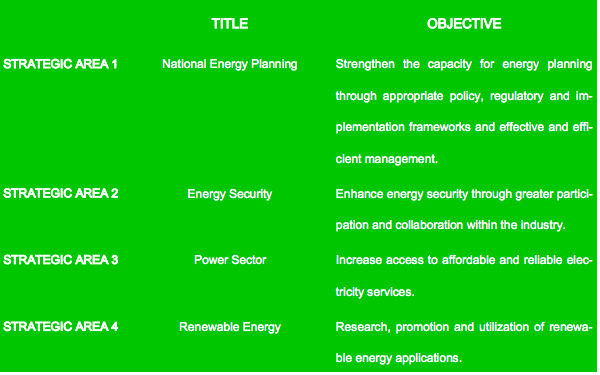
2.1 Vision, Mission, Strategic Areas and Objectives
Vision : A sustainable energy sector for Fiji
Mission : To provide an enabling environment for a sustainable energy sector
In attaining a sustainable energy sector, the NEP shall focus on four key strategic areas with the following objectives:
2.2 Policies
The policy statements provided below reflect the focus in each of the key strategic areas. These policy statements will be reviewed every five years.
2.2.1 National Energy Planning
The importance of energy planning in an economy cannot be overemphasised. Rising fuel prices and the dependence of the country on imported commercial energy sources make energy planning critical.
Government must demonstrate the ability to plan, develop, implement and manage energy sector development plans. It is therefore necessary that Government maintains an energy planning office that is equipped with the right level of resources in terms of staffing and funding. One of the principal functions of the energy planning office will be to ensure that appropriate energy policy issues are effectively addressed through sustainable mechanisms that support and promote Government’s social and economic development plans.
2.2.1.1 Policies
i Strengthen the capacity of DOE to plan, formulate, implement and manage the energy policy and other energy related policies and regulations;
ii Ensure appropriate policy and regulatory frameworks for the provision of energy services;
iii Strengthen coordination and consultation with other sectors and the external environment on energy developments;
iv Enhance energy information and data management programs for planning purposes.
2.2.2 Energy Security
Fiji is located in a remote small market for energy commodities. Fuel imports are a major component of the country’s current import bill. Affordable, stable and secure sources of energy are vital for Fiji’s future economic growth and prosperity and it is Government policy to promote energy self-sufficiency to reduce the country’s vulnerability to external forces or an energy crisis. An energy crisis is a situation in which there are disruptions in oil supplies that increases energy prices rapidly and threatens economic stability and security. Present market conditions suggest that the potential for such a situation is high. There are five principal issues of energy security from a national perspective:
- domestic production capacity of alternative fuels;
- dependence on imports;
- the degree of import concentration;
- fuel stocks relative to imports; and
- the ability to secure an alternative source for petroleum imports in the event of an interruption from one or more suppliers.
In ensuring that the country has maximum energy security, it is important that attention is paid to energy conservation and efficiency measures in all spheres of energy development. The areas of the energy market, apart from the petroleum sector shall be provided assistance in energy conservation and efficiency.
Efforts and resources will be directed to the development of indigenous energy resources. In the face of rising imported fuel costs, the use of indigenous energy sources such as solar, wind, hydro, biomass and bio-fuels derived from agricultural crops have great potential to meet the energy needs at both national and local levels.
2.2.2.1 Policies
i. Promote the development of indigenous energy sources such as hydropower, geothermal, solar, wind and biomass;
ii. Promote energy efficiency and energy conservation in all sectors;
iii. Strengthen energy security and improve energy supply mix for the country.
2.2.3 Power Sector
Government will continue to promote power sector development in order to meet future needs and improve quality of supply. Reliable and affordable electricity is considered a major element of economic and social development in both urban and rural areas. Government expects electricity tariffs to become increasingly cost-reflective at all levels both within the national grid and in off grid rural electrification schemes. Power projects may be associated with adverse impacts and if long-term sustainability is to be achieved, these must be managed. In future government will expect greater public participation in decisions on power sector development and investments.
The FEA will remain the sole operator of the national grid. The Government will, however continue to reform the electricity industry with the aim to improve the economic efficiency of the sector and to establish an environment that promotes participation by private investors and lenders. Regulation, re-organization, competition, private participation, and other electricity sector reform elements are not seen as ends in themselves, but contribute to the achievement of development goals such as better system security, reduced vulnerability to external factors, increased economic growth, greater environmental sustainability, accelerated poverty alleviation and improved commercial and operational performance of all service providers. With a view to avoid conflicts of interest that occur in self-regulating utilities the prime objective of utility regulation will be to reduce and manage the risk associated with market failure.
Government energy policy will re-enforce the reform provisions of the Public Enterprise Act that require:
FEA “to operate as a successful business and, to this end, to be as profitable and efficient as
comparable businesses which are not owned by the State”
FEA to “focus on commercial activities, and for this purpose any activity of a government policy formulation or regulatory nature will, wherever possible, be transferred from FEA to a department, separate regulatory authority or other agency”
FEA to “be appropriately compensated for any non-commercial obligations”
In parallel with the reform program an investment program is being pursued to expand FEA’s system to meet demand growth and broaden access to electricity. Expenditures of F$500 million are planned over the next five years. As this exceeds the resources of FEA and the Government private sector investment of F$150 million is budgeted for the period, principally in generation. The private sector will assess the risks associated with power sector investment and its involvement will generally reflect the investment environment in the sector in particular the efficacy and independence of regulation. It is an explicit objective of the Government to create a level playing field for private sector investors or Independent Power Producers (IPP) in the area of electricity generation. Competitive procurement will be the principle means of private sector participation. Government will define IPP implementation procedures and regulations and implementation guidelines that will bind parties to an orderly transparent process. Features will include:
Procurement guidelines using international competitive bidding;
Specification of standards to apply to all project studies and investigations;
Discrete procedural steps to ensure that information about the project provides an adequate and appropriate basis for negotiating the commitments entered into at each stage of the implementation process;
Defined responsibilities of government agencies, stipulating contact points and coordinating functions for greater ease of investors;
Timelines for meeting obligations and giving approvals; and
Regulations and model contracts providing a basis from which concessions and power purchase agreements will be negotiated.
Energy services for low income households have not been adequate, since previous emphasis was to meet the needs of the industrial sector and the urban society. Only 50 % of Fiji’s rural population has access to electricity. Social infrastructure such as schools are not adequately supplied. Although most household consumers are women, past energy policy has not adequately considered their needs. In the area of Rural Electrification the Government is committed to promote access to affordable electricity services for disadvantaged households, small businesses, small farms and community services. Wherever technically and economically feasible extensions of the existing FEA grid will be used as a means of rural electrification.
Many remote islands and rural areas in Fiji lie beyond the economic reach of the three main FEA grids and Government therefore promotes commercially prudent and sustainable electrification in off-grid areas to improve socio-economic conditions within isolated rural communities. Government policy is to develop methods by which connections can be affordable in rural areas, and by which the number of connections can be increased rapidly, while also assuring that supply is reliable.
The RESCO model will be further developed as a means to accelerate subsidised rural power supply with active participation of private sector service providers. As a long term objective Government will reduce its role in RESCO type electricity supply and focus on improving the enabling and regulatory framework for expanded RESCO operations. Private sector electrification efforts will be allowed as long as safety standards are maintained, but will not automatically qualify for Government subsidies.
Government will remain committed to its rural electrification policy and will use the following criteria for the establishment of priority target key areas:
Contributions from the villages. Villages where contributions to the required up-front investment exceed the current 10 % compulsory contribution.
Focal villages and settlements where joint infrastructure development is possible and infrastructure service packages promise to trigger economic development.
Areas identified as most likely to optimise income-raising and socio-economic benefits from electricity supply.
Locations where environmental protection and rural development measures are complemented by electricity supply.
Locations where organizational initiative is demonstrated as adequate to assure reliable and expanded supply.
Villages where electrification complements social, economic, and environmental priorities of localities
The Government will also develop mechanisms for measuring and ensuring reliable performance of rural electrification schemes and expansion of supply and in particular, develop incentive systems.
2.2.3.1 Policies
i. Ensure the demand for reliable and affordable electricity is adequately met.
2.2.4 Renewable Energy
Government believes that renewable energies can in many cases provide the least cost energy service, particularly when social and environmental costs are included, and will therefore provide focused support for the development, demonstration and applications of renewable energy. In particular, government will facilitate the sustainable production and management of solar power and non-grid electrification systems, such as the further development of solar home systems (SHS), solar pump water supply systems, solar systems for schools and clinics and solar water heating systems for homes and institutions. All of the above will be largely targeted at rural communities.
In the urban and modern sector Government will promote grid connected renewable energy generation based on wind, geothermal and hydropower. Government will thoroughly analyse the feasibility of a bio-fuel program with the objective to stabilise agricultural production and income in Fiji’s traditional export crop sectors sugar and coconut. As a medium term target a 5 % renewable energy based addition to bio-fuel blends (alcohol for [...].
v. Energy Efficiency and Conservation: An average household in Fiji spends about F$720 every year for electricity bill. A big portion of this bill is caused by the use of inefficient appliances and equip-ment in homes. The capital cost of these appliances may be relatively cheap as compared to more effi-cient and expensive counterparts but they consume more electricity and hence in the long run the house-hold is worse off.
With rising imported fuel price, energy efficiency and conservation measures will be promoted widely to try and lessen the impacts on the livelihood of the ordinary citizens. Energy efficiency and conservation also has a very strategic role in protecting our environment especially in a country that is dependent on fossil fuel for its power generation. By reducing energy use through energy efficiency and conservation measures means that we burn less fossil fuels and reduce greenhouse gas emissions that cause global warming and associated sea level rise – both phenomena cause immeasurable damages to our environ-ment.
Energy conservation and efficiency measures will be encouraged in all aspects of any energy initiative from planning, operation and use of systems. Energy conservation and efficiency will not be restricted to the energy sector but will include other sectors as well.
2.4 Implementation Strategy
The Department of Energy (DOE) will be the lead organisation responsible for the implementation of the NEP. In implementing the NEP, DOE will liaise closely with the various line departments and organisations both within and outside government to ensure that the objectives of the NEP are adequately met. To en-sure coordination amongst various stakeholders an Energy Advisory Board (EAB) whose members are drawn from both within and outside government will be set up. The EAB will provide guidance in matters of new policy direction and initiatives to ensure that the NEP captures the aspirations of the National Strategic Development Plan (NSDP: 2007 –2011). As the NEP will align itself closely to the NSDP the timeframe for reviewing the NEP will fall in line with that of the NSDP.
The strategic action plan provides specific information on strategies and actions that will be implemented to achieve the desired strategic objectives, policies, and the overall vision for the energy sector. The plan will be reviewed on a yearly basis.
3.0 Strategic Action Plan
1. National Energy Planning
Policy 1.1 Strengthen the capacity of DOE to plan, formulate, imple-ment and manage the energy policy and other energy related policies and regulations.

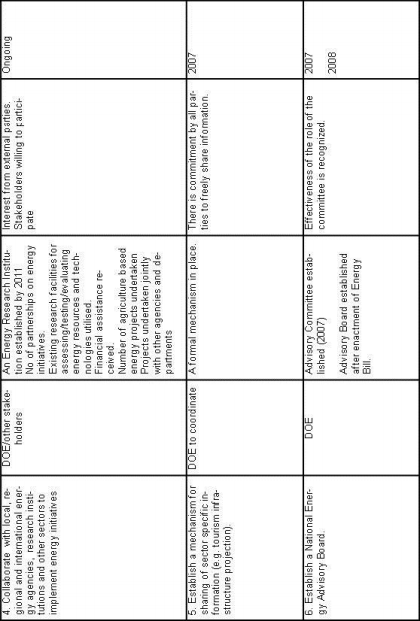
Policy 1.3 Strengthen coordination and consultation with other sectors and the external environment on energy developments
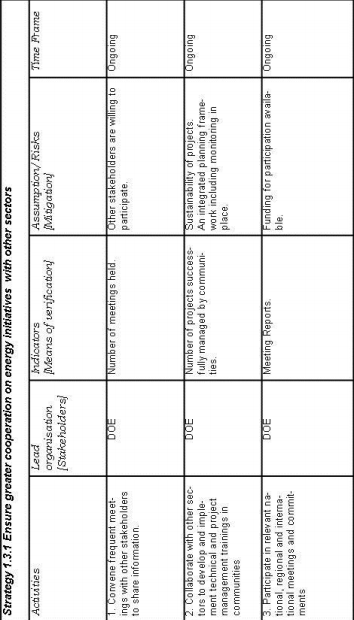
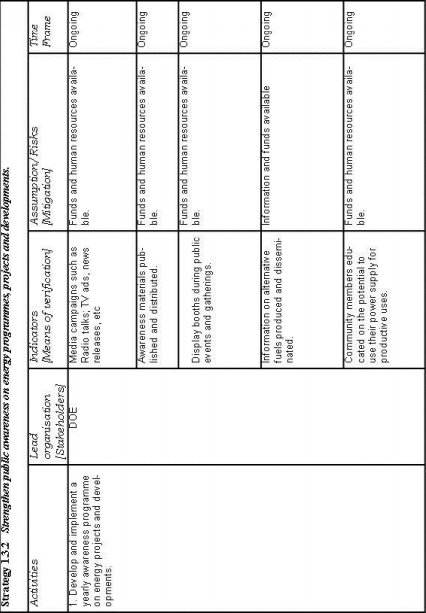
Policy 1.4 Enhance energy information and data management programs for planning purposes.
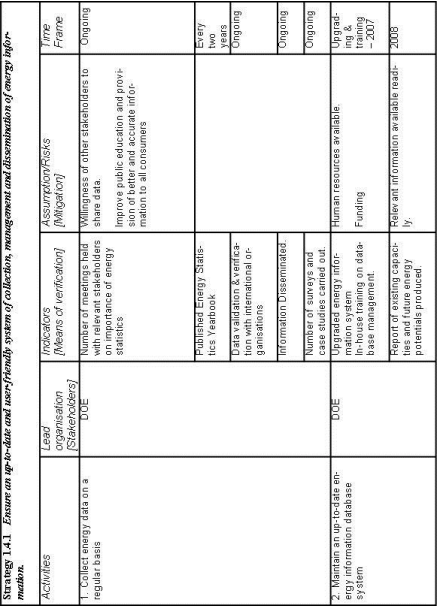
2. Energy Security
